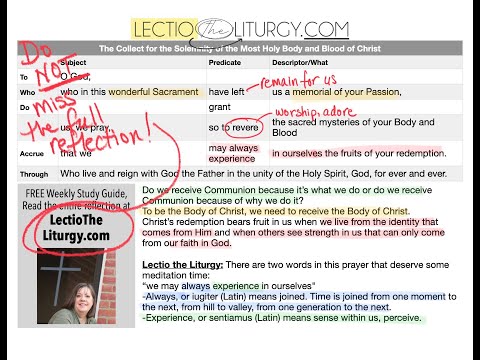Collect for the Solemnity of the Body & Blood of Christ
Thank you for joining me. This week we Lectio the Liturgy with the Collect for the Solemnity of the Most Holy Body and Blood of Christ.
O God, who in this wonderful Sacrament have left us a memorial of your Passion, grant us, we pray, so to revere the sacred mysteries of your Body and Blood that we may always experience in ourselves the fruits of your redemption. Who live and reign with God the Father in the unity of the Holy Spirit, God, for ever and ever.
The Collect this week is also used in the prayers of Benediction, which is a time when the Eucharist is exposed and people are welcome to come to worship and pray. It’s a fitting prayer for that moment, because it’s through the adoration of the Body and Blood of Jesus that we are changed.
Are we? Are we changed? Do we receive Communion because it’s what we do or do we receive Communion because of why we do it?
Why do Catholic churches celebrate the Sacrament of the Eucharist every day? Why do we strive to receive Holy Communion at least once week? Our Protestant friends don’t. Have you ever wondered about that? Actually for Protestant churches, the sermon is considered the centerpiece of the service. But the Catholic Mass isn’t a church service. The Mass is prayer, and the centerpiece is the Eucharist.
As Catholics, to be the Body of Christ, we need to receive the Body of Christ, the Eucharist. As I prayed about writing this today, and as I headed to daily mass, I asked God to show me, at mass today, the significance of the Body of Christ. He did and in a big way.
As I prayed Morning Prayer, a friend came and joined the pew. She’s been on my mind and in my prayers for two days, yet, strangely, somehow, I wasn’t surprised that she was there. You see, her husband unexpectedly passed away yesterday. We grasped hands and hugged, we prayed the mass, we received the Body of Christ.
When the other worshippers left, we talked and prayed. Why did she come? Because at the lowest point of her life, she knew she needed the Body of Christ, not only in the Eucharist, but in the people who are his Body.
The Accrue of the prayer is experiencing the fruit of Christ’s redemption. Christ’s redemption bears fruit in us when we live from the identity that comes from Him and when others see strength in us that can only come from our faith in God. Two examples are Moses and Ruth. The fruit of Moses’ redemption brought the Israelites out of slavery. The fruit of Ruth’s redemption may have seemed insignificant at the time, but she became the great-grandmother of David. Her “yes” became a part of Salvation History.
The Accrue is a dependent phrase. It depends on the Do. To perceive or experience the fruit of Jesus’ Redemption in us relies on our reverence to the Body and Blood of Christ.
This week as we Lectio the Liturgy, there are two words in this prayer that deserve some meditation time: “we may always experience in ourselves"
-Always, or iugiter (Latin) means joined. Time is joined from one moment to the next, from hill to valley, from one generation to the nex
-Experience, or sentiamus (Latin) means sense within us, perceive.
As I prayed with my friend today, I asked God to open her senses in a new way, that she would always experience, she would hear and feel, the closeness of God like she never has before, that the fruit of Jesus’ Redemption draws her close to him as a child of God. I pray the same for you this week.
Thank you for praying with me,
Julie
